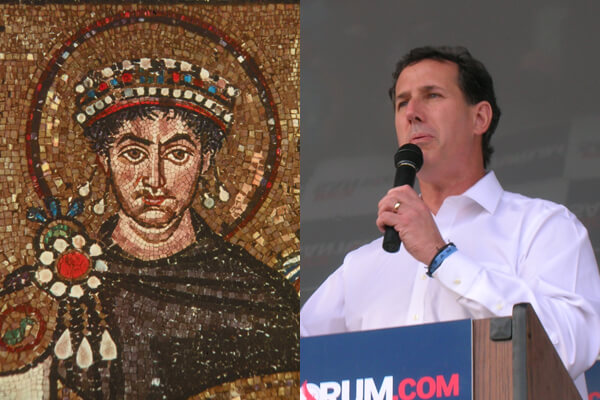Lessons from the Sixth Century
Anti-gay Christianist rhetoric no more empirically grounded than in Emperor Justinian’s day
Justinian, the sixth century Byzantine emperor, and Rick Santorum, the former two-term US senator from Pennsylvania. | STANFORD.EDU / RICKSANTORUM.COM
Among his innovations, Justinian is known for codifying Roman law. The Byzantine emperor issued the Codex Justinianus in two texts that were supplemented by 150 edicts. Two edicts condemned homosexual acts and promised harsh punishments for those who did not repent.
“For we are taught by Holy Scriptures that because of like impious conduct cities have indeed perished together with the men in them,” read the one issued in 538 A.D. “For because of such crimes there are famines, earthquakes, and pestilences.”
Justinian was a Christian and believed that God destroyed the people of Sodom for engaging in sodomy. The second edict, issued in 544 A.D., referred to that story.
“For, instructed by Holy Scriptures, we know that God brought a just judgment upon those who lived in Sodom, on account of this very madness of intercourse, so that to this very day the land burns with inextinguishable fire,” the edict read.
Justinian instructed officials across his empire to enforce the law “so that the city and the
state may not come to harm by reason of such wicked acts.”
For much of human history, the causes of natural disasters and diseases were unknown, so the devout turned to supernatural explanations for them. What is inexplicable is that today the reasons for opposing same-sex marriage and other goals sought by the queer community are as magical as the arguments Justinian made 1,400 years ago.
“It has to do with the notion of corporate penalty,” said Stephen V. Sprinkle, a theology professor at Brite Divinity School at Texas Christian University. “If you have heretical or dissident sectors of a society or a nation, then everybody else is going to get tarred with the same brush.”
Some Christians may believe that tolerating homosexuality will lead God to destroy America, but they refrain from saying so publicly to avoid embarrassment.
In 2001, Jerry Falwell, a leading religious conservative, and Pat Robertson, a televangelist, said the attacks on the World Trade Center and the Pentagon occurred because God stopped protecting America. Falwell blamed “the pagans and the abortionists and the feminists and the gays and lesbians who are actively trying to make that an alternative lifestyle, the ACLU, People for the American Way, all of them who are trying to secularize America.” After an angry outcry, Falwell, who died in 2007, apologized.
Today, the threats purportedly posed by homosexuality are serious, but vague.
“We must choose between homosexuality and freedom because we cannot as a country, we cannot as a nation… we cannot have both,” said Bryan Fischer, a senior staffer at the American Family Association, a right-wing group, on July 6 on his Internet radio show. “Every advance of the homosexual agenda comes at the expense of liberty. Anywhere the homosexual agenda makes progress, liberty is in retreat.”
Conservatives claim that same-sex marriage will harm religious freedom or require that children be taught about homosexuality in schools. How and why these things will occur is never explained.
“We have to recognize that this decision about what we call marriage has consequences which go far beyond a loving couple,” Mitt Romney, the presumptive Republican nominee for president, said during a January debate. “Calling it marriage creates a whole host of problems for families, for the law, for the practice of religion, for education.”
In 2004, Romney, then the governor of Massachusetts, spoke at length about his opposition to gay marriage at a hearing before the Senate Judiciary Committee. He was no more specific then as he asserted that same-sex marriage would somehow bring about sweeping changes.
“It is inconceivable that promoting absolute indifference between heterosexual and homosexual unions would not significantly affect child development, family dynamics, and societal structures,” he said, adding later, “This is not a mere political issue. It is a societal issue. It encompasses the preservation of a structure that has formed the basis of all known successful civilizations.”
Gay and lesbian couples have been marrying in Massachusetts since 2004 and none of the calamities that Romney predicted have occurred. Dozens of studies of the children of gay and lesbian couples have found no significant differences between them and children raised by heterosexual parents. But Romney also said at the hearing that these effects would not be seen for “at least a generation probably several generations.”
Similarly, in the run-up to the 2004 debate over an amendment to the US Constitution that banned such marriages, Rick Santorum, then a US senator from Pennsylvania, called gay marriage “the death knell of our society” that would lead to “the ultimate breakdown of the traditional family and the meaning of that to future generations of children.”
The next year, Santorum told the New York Times that gay marriage could harm his marriage saying, “It threatens my marriage. It threatens all marriages. It threatens the traditional values of this country.”
Like Romney, Santorum softened his tone during the Republican presidential primary. He continued to support an amendment to the US Constitution that would ban same-sex marriage. Another five states allowed gay and lesbian couples to wed since Santorum made his comments and he remains married to Karen, his wife of 22 years.
“It’s very mean stuff,” Sprinkle said. “It’s irrational, it’s magical, but it’s also very apocalyptic. There’s no reasonable conversation that you can have with it.”
While most conservatives clearly feel that they can no longer use the harsh anti-gay rhetoric that was employed decades ago, their language still suggests that the queer community is a threat to the wider society.
“It doesn’t take into account that there could possibly be any humanity on the side of LGBT relationships,” Sprinkle said. “There’s no conversation about rights.”



































